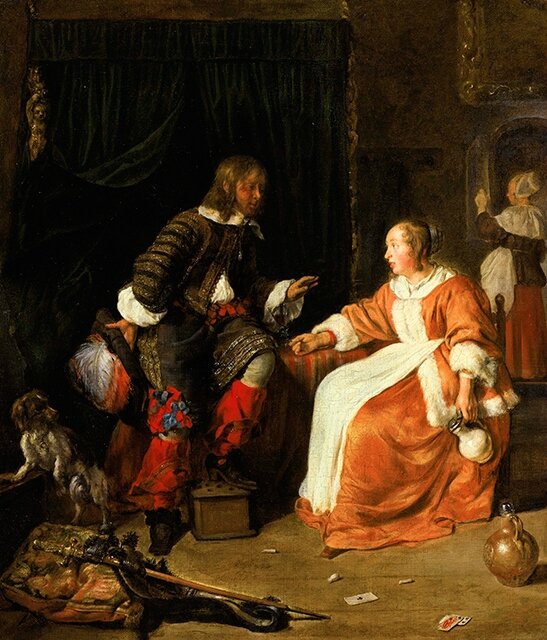Restituted Dutch masterwork 'The Rothschild Metsu' to be offered at Sotheby's New York
Gabriel Metsu, An Officer Paying Court To A Young Woman. Signed lower center on the foot stove: GMetsu (GM in ligature). Oil on canvas, 16 by 14 in; 40.6 by 35.5 cm. Est. $6/8 million. Photo: Sotheby's.
NEW YORK, NY.- Sotheby’s New York auction of Master Paintings on 26 May 2016 will feature one of the finest Dutch genre scenes remaining in private hands: Gabriel Metsu’s An Officer Paying Court to a Young Woman (estimate $6–8 million). This refined interior stands as a lasting achievement of painting in the Golden Age of the mid-17th century, when Metsu and his peers – including Johannes Vermeer, Gerrit Dou and Frans van Mieris – were creating vivid scenes of everyday life. The work is further distinguished by the many historical labels on its reverse, which tell its fascinating journey through one of the most momentous periods in recent history.
The picture entered the Viennese Rothschild family’s legendary collection by 1866, and descended in the family for decades. The contents of the family’s palace in Vienna were targeted and seized by Nazi authorities in 1938, and the collection – including the Metsu – was removed to the central depot of the Kunsthistorisches Museum in Vienna.
The Rothschild Metsu was one of the masterpieces selected for the grandiose museum that Hitler planned to construct in Linz. When this treasure trove was in danger of Allied bombing, the Metsu and some 6,500 other paintings – including Jan van Eyck’s Ghent Altarpiece – were moved for safekeeping to the salt mines in Altausee. The Allied Forces’ celebrated Monuments Men later recovered these works, thwarting a plan by the Nazi district leader to destroy the mines in response to Hitler’s Nero Decree. After having been inventoried, photographed and identified by the Monuments Men as the property of the Rothschild family, the present picture was returned to Vienna in November 1945.
At this time, the Baroness von Rothschild was determined to recover her collections and export them to her new home in the United States. She was granted export licenses for the bulk of the works, but only on the condition that she donate a number of her most important pieces to the Austrian state. In 1948, some 250 highlights from the family collection entered the inventories of Viennese museums, with The Rothschild Metsu returning to the Kunsthistorisches Museum – the very museum where it had previously been held after its original seizure from the family palace.
Under the restitution laws introduced in Austria in 1998, the Rothschild family was able to reclaim the paintings they had unwillingly donated in 1948. And so it was that The Rothschild Metsu was returned to the family, and sold at auction in 1999 to the present owner.
Christopher Apostle, Head of Sotheby’s Old Master Paintings Department in New York, said: “Gabriel Metsu ranks as one of the most important painters of his day, and An Officer Paying Court to a Young Woman is both a beautiful and quintessential example of his best work. The painting represents a near perfect distillation of the class Golden Age genre scene, containing many of the hallmarks of this category: two elegant people dressed in rich fabrics, a dog – representing fidelity, or in this case a lack thereof – jugs and wine glasses, all set in a typical Dutch interior space. No finer work by the artist has ever been offered at auction, making our May sale a rare opportunity for collectors to acquire such a masterpiece.”
Painted circa 1658-60, An Officer Paying Court to a Young Woman is a testament to the time in which time Metsu was at the peak of his artistic powers and commercial popularity. Having begun his career at the age of 14 in his native Leiden, he soon established himself as a master in his field and became a founding member of the painter’s guild in 1648. His early technique was influenced greatly by Gerrit Dou, whose transformational style ushered in a taste for small scale, minutely-detailed pictures featuring an excess of genre subjects.
Once Metsu moved to Amsterdam in 1654, he found himself gravitating towards portraying elegantly-dressed upper class subjects, shifting away from large-scale historical, allegorical and religious subjects – at the time dominated by Rembrandt and his followers. In Amsterdam, Metsu discovered a rapidly expanding market for this underrepresented collecting category, and was able to carve out his niche as the preeminent genre painter.
An Officer Paying Court to a Young Woman is a quintessential example of the artist’s unique style, drawn from the very best elements of Dutch genre painting. Set in a quiet moment inside of a tavern, the painting depicts a silent exchange between an elegantly dressed man and woman. Of particular beauty are the figure’s luxurious costumes, which mirror Metsu’s meticulous application of paint to mimic the play of light.

/https%3A%2F%2Fprofilepics.canalblog.com%2Fprofilepics%2F1%2F0%2F100183.jpg)
/https%3A%2F%2Fstorage.canalblog.com%2F03%2F02%2F119589%2F96711876_o.jpg)
/https%3A%2F%2Fstorage.canalblog.com%2F11%2F31%2F119589%2F94773502_o.jpg)
/https%3A%2F%2Fstorage.canalblog.com%2F20%2F83%2F119589%2F94772815_o.jpg)
/https%3A%2F%2Fstorage.canalblog.com%2F26%2F72%2F119589%2F75604929_o.jpg)
/https%3A%2F%2Fstorage.canalblog.com%2F59%2F60%2F119589%2F26458628_o.jpg)



/http%3A%2F%2Fstorage.canalblog.com%2F44%2F67%2F119589%2F120599661_o.jpg)
/http%3A%2F%2Fstorage.canalblog.com%2F37%2F47%2F119589%2F117900055_o.jpg)
/http%3A%2F%2Fstorage.canalblog.com%2F68%2F84%2F119589%2F117634633_o.jpg)
/http%3A%2F%2Fstorage.canalblog.com%2F08%2F46%2F119589%2F110830617_o.jpg)